Energy coincidences (or not?)
Ralitsa Kovacheva, August 1, 2010
 In the season at its height, the Bulgarian Black Sea coast remained without electricity for two days. I thought about this while reading the news from a conference on energy security in the Black Sea region(July 27, Odessa, Ukraine). Of course, the link between the fall of a Bulgarian electricity transmission line and the energy policy in the region is just a metaphor. And maybe, a coincidence in time. Lately, however, it seems as if energy coincidences became too many.
In the season at its height, the Bulgarian Black Sea coast remained without electricity for two days. I thought about this while reading the news from a conference on energy security in the Black Sea region(July 27, Odessa, Ukraine). Of course, the link between the fall of a Bulgarian electricity transmission line and the energy policy in the region is just a metaphor. And maybe, a coincidence in time. Lately, however, it seems as if energy coincidences became too many.
Only two weeks ago, for example, Bulgaria and Russia have agreed (among other things, in the dark quite literally, because during the meeting in Evksinograd the 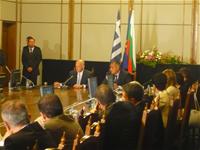 electricity had stopped) for lower gas prices in return for the continuation of the South Stream project. These days Greek Prime Minister Georgios Papandreou was in Sofia, together with his entire government, to discuss issues of common interest and, of course, common energy projects – Bourgas-Alexandroupolis, South Stream and even the nuclear power plant Belene. Again, a thin detail is that a few days earlier Russian Prime Minister Vladimir Putin had phoned Papandreou and Bulgarian Prime minister Boyko Borissov to discuss the same topic.
electricity had stopped) for lower gas prices in return for the continuation of the South Stream project. These days Greek Prime Minister Georgios Papandreou was in Sofia, together with his entire government, to discuss issues of common interest and, of course, common energy projects – Bourgas-Alexandroupolis, South Stream and even the nuclear power plant Belene. Again, a thin detail is that a few days earlier Russian Prime Minister Vladimir Putin had phoned Papandreou and Bulgarian Prime minister Boyko Borissov to discuss the same topic.
The picture is not complete without mentioning US ambassador in Sofia James Warlick's hyperactivity, which is especially vigorous on energy projects and Bulgaria's priorities. And within a few weeks he has suggested two major American projects in this area. Each time his statements carry the same message: Bulgaria should follow the energy priorities set by its Euro-Atlantic orientation.
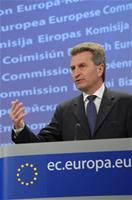 For the sunken in a debt crisis EU, the energy sector is not currently the subject of the day, but right on Tuesday, while in Bulgaria the three major energy projects with Russia were being discussed, EU Commissioner Guenther Oettinger had decided to recall Europe's energy priorities. The Commissioner took part in a conference on energy security and investments in the Black Sea area in the Ukrainian city of Odessa. The location is a key one, because Ukraine currently finds itself between Russian pressure and the European perspective. (Although Bulgaria is a member of the EU for three years now, the situation of our country is similar and the pressure from various sides is visible).
For the sunken in a debt crisis EU, the energy sector is not currently the subject of the day, but right on Tuesday, while in Bulgaria the three major energy projects with Russia were being discussed, EU Commissioner Guenther Oettinger had decided to recall Europe's energy priorities. The Commissioner took part in a conference on energy security and investments in the Black Sea area in the Ukrainian city of Odessa. The location is a key one, because Ukraine currently finds itself between Russian pressure and the European perspective. (Although Bulgaria is a member of the EU for three years now, the situation of our country is similar and the pressure from various sides is visible).
The country has just experienced a short but edifying gas crisis, a year and a half after the big one - in the beginning of 2009. It has also received a proposal from Russian Prime Minister Vladimir Putin personally for a merger between Gazprom and its little brother - the Ukrainian Naftogaz. For Russia this is a double reassurance - gaining control on Ukrainian pipes to Europe, on the one hand and the realisation of South Stream project with further 63 billion cubic meters of annual capacity, on the other, to bypass the troublesome transit country. Ukraine has not directly responded to the offer.
The Commissioner explained the above in the usual Brussels language, which is complicated: "The country is at a cross-road where it has a unique opportunity to ensure that it continues to make commercial sense for the gas market players to use the Ukrainian gas transportation network as one of the preferred routes for Russian gas supplies to the EU.”
Mark in your mind the "commercial meaning", namely the market reason, instead of the Russian strategy of political bargaining, which has been also applied in Bulgaria. To be more convincing, the EU assists Ukraine in its efforts to modernise its natural gas transit system. Moreover, the country has begun some legislative changes to reform its energy sector, which the EU has praised as a step in the right direction. Furthermore, Oettinger stressed that “trade and investments in the energy sector are best supported by multilateral frameworks ensuring transparent market rules, protection of investments and predictability and fair conditions for transit and trade of energy”.
Except for Russia, Black Sea countries are WTO members and have signed and ratified the Energy Charter Treaty, Oettinger said. Moreover, several countries, without being EU members, are willing to integrate their energy markets based on European legislation and are in various stages of progress. "We will pursue market integration with those countries wishing to do so, in the framework provided by the Energy Community Treaty. The accession of Ukraine will be a major event in the coming months. We will continue to accompany and support Ukraine along the road of reforms", Oettinger stated.
The Commissioner praised Turkey which, despite the difficult EU accession negotiations, has in many aspects already harmonised its legislation in this area with European rules. Oettinger also stressed the “bilateral negotiations with Armenia, Georgia and Azerbaijan in view of concluding Association Agreements which will bring the Southern Caucasus region closer to the EU”.
Against this background, Commissioner Oettinger was very clear with regard to Russia. Firstly, it must participate in the market according to the common rules. Russia is currently negotiating for WTO membership and for the Energy Charter Treaty,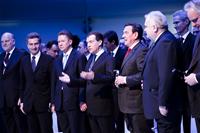 which it has so far refused to sign. At the same time, Oettinger said, "we expect our Russian partners to understand our security of supply policy based on diversification of supply routes and sources”. (Theoretically it is true, but let us remember that in April Oettinger personally attended a ceremony in the compressor station Portovaya in Viborg (Russia), where the construction of the Nord Stream pipeline had begun under the Baltic Sea in the direction of Germany) .
which it has so far refused to sign. At the same time, Oettinger said, "we expect our Russian partners to understand our security of supply policy based on diversification of supply routes and sources”. (Theoretically it is true, but let us remember that in April Oettinger personally attended a ceremony in the compressor station Portovaya in Viborg (Russia), where the construction of the Nord Stream pipeline had begun under the Baltic Sea in the direction of Germany) .
The issue of the special relationship between Germany and Russia is a subject to a separate analysis. European energy policy, however, has several priorities, among which the so-called Southern Gas Corridor is primus inter pares (first among equals): "The European Commission is aware that sometimes extraordinary measures are needed. For example, in gas markets, an extraordinary effort is needed to open the Southern Gas Corridor", Guenther Oettinger admitted in Odessa.
The fate of the Nabucco project until now fully supports his words. There is, however, hope that the project could progress further since Turkey and Azerbaijan have finally agreed for the Shah Denis 2 gas field. Azerbaijan is a strategic European partner in the region, the Commissioner said and predicted that “in the coming months important steps will be taken towards the investment decision on Nabucco.”
Oettinger unequivocally identified the project as responding to public interest in a search for energy security. Because “the gas markets isolation of Central and Southern EU Member States is a concern to the Commission". But either Sofia does not suffer from such concerns or it conceals it too well.
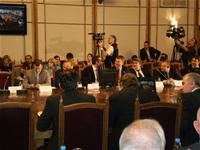 Because in the same time while Oettinger was speaking in Odessa, in Sofia Boyko Borissov and Georgios Papandreou discussed South Stream, Bourgas-Alexandroupolis and Belene. Nabucco was vaguely mentioned, but there is not much to say right now anyway. A curious detail is that after taking part in the joint meeting of the Greek and Bulgarian governments, the Minister of Economy and Energy Traycho Traykov went to Odessa, where, according to the programme of the conference, he had participated in a panel on energy challenges in the Black Sea region, together with EU Commissioner Oettinger. Traykov's Press Office confirmed this information and promised to send a detailed press release, which never happened.
Because in the same time while Oettinger was speaking in Odessa, in Sofia Boyko Borissov and Georgios Papandreou discussed South Stream, Bourgas-Alexandroupolis and Belene. Nabucco was vaguely mentioned, but there is not much to say right now anyway. A curious detail is that after taking part in the joint meeting of the Greek and Bulgarian governments, the Minister of Economy and Energy Traycho Traykov went to Odessa, where, according to the programme of the conference, he had participated in a panel on energy challenges in the Black Sea region, together with EU Commissioner Oettinger. Traykov's Press Office confirmed this information and promised to send a detailed press release, which never happened.
The question ultimately is about priorities. Which are Bulgaria's energy priorities and how do they overlap with those of the EU? The draft energy strategy of the country, published last month, says the following: "Bulgaria has a direct interest and will directly participate in the realisation of strategic EU initiatives to build the necessary infrastructure and diversification of energy supplies for the EU - namely the Southern Gas Corridor, access to liquefied natural gas (LNG) and transmission links of the axis North-South etc. Given the high gas dependence and inadequate energy infrastructure in the country, these initiatives are of particular importance for us and for the entire region of Southeast Europe."
In terms of the NPP Belene the government is committing itself in the following context: "Institutional support and monitoring of projects of strategic importance for energy security, including investors in new gas plants, that will be needed to balance the production of wind farms and of the Belene NPP project, as a project dominated by the participation of foreign investors.” Theoretically there is a complete overlap of Bulgarian priorities with those of Europe. The strategy, however, is still a draft and we do not know whether it is not being changed right now right in front of our eyes.
The strong Russian pressure is a fact, at the expense of a timid and diffuse European energy policy. The active US presence in the person of Ambassador Warlick is a fact. Also a fact is the government's attempt to convince us that there is a position on joint projects with Russia, which is even hard and consistent. Another fact is also that, while the common European energy policy remains mostly on paper, countries rely primarily on bilateral relations with Moscow (see a comment here) that makes Bulgaria's task more difficult. Because lately many people have acknowledged that it was not easy to be "in private" with Russia when it wants something very much.
Obviously, all these energy coincidences are unlikely accidental, and the time has  come some important but inconvenient decisions to be taken. Moreover, these to be clearly politically and economically justified. High voltage should be consumed as energy for a clear and firm political action. Anything else would mean a short circuit.
come some important but inconvenient decisions to be taken. Moreover, these to be clearly politically and economically justified. High voltage should be consumed as energy for a clear and firm political action. Anything else would mean a short circuit.
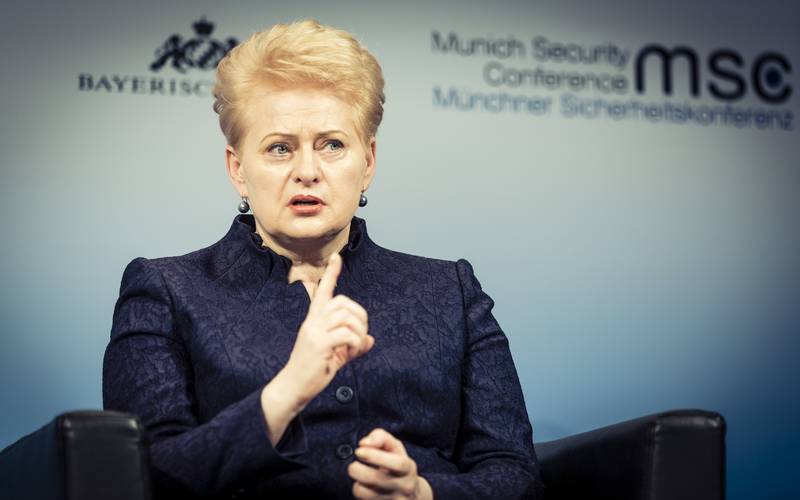 Dalia Grybauskaite | © MSC/Koerner
Dalia Grybauskaite | © MSC/Koerner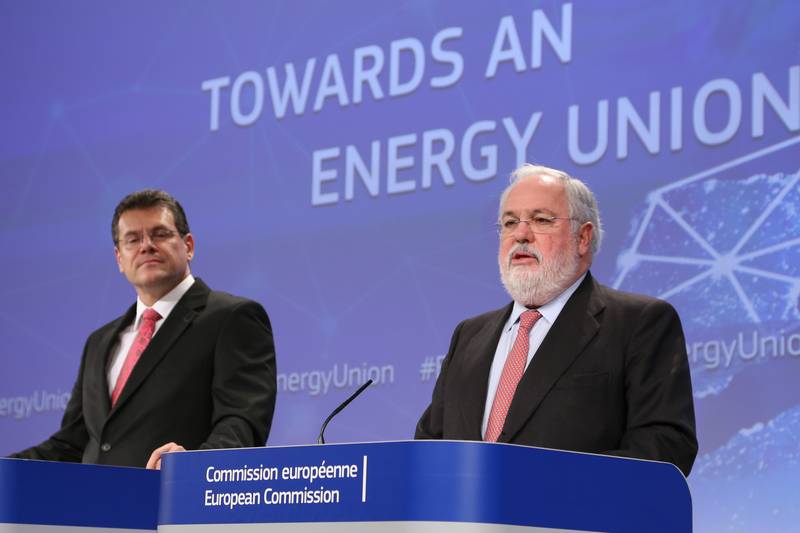 Maros Sefcovic, Miguel Arias Canete | © European Commission
Maros Sefcovic, Miguel Arias Canete | © European Commission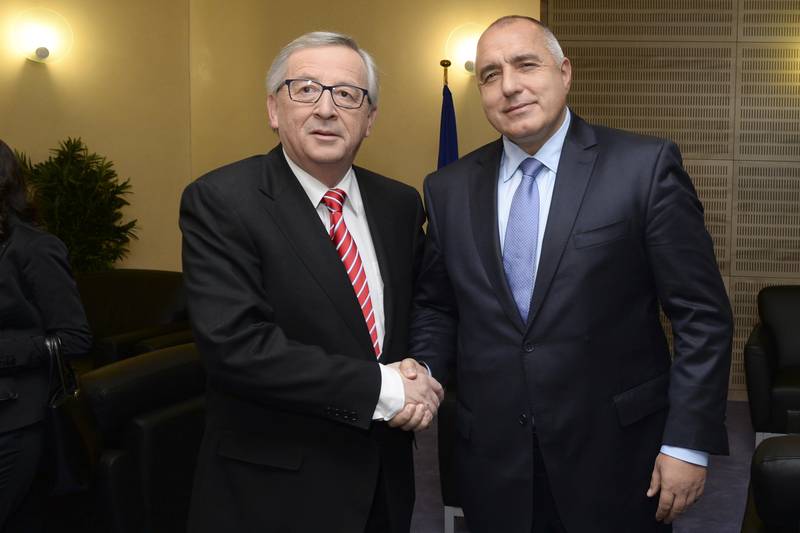 Jean-Claude Juncker, Boyko Borissov | © European Commission
Jean-Claude Juncker, Boyko Borissov | © European Commission